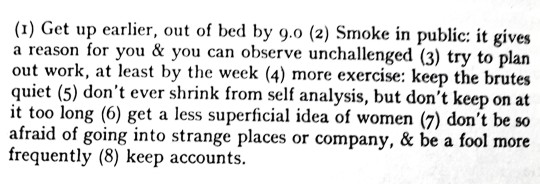Text
An’ we felt the power that fashion’d
All the lovely things we saw,
That created all the murmur
Of an everlasting law,
Was a hand of force an’ beauty,
With an eagle’s tearin’ claw.
Then we saw our globe of beauty
Was an ugly thing as well,
A hymn divine whose chorus
Was an agonizin’ yell;
Like the story of a demon,
That an angel had to tell;
Like a glowin’ picture by a
Hand unsteady, brought to ruin;
Like her craters, if their deadness
Could give life unto the moon;
Like the agonizing horror
Of a violin out of tune.
Sean O’Casey, from Juno and the Paycock (1924)
1 note
·
View note
Photo

The most popular browsers in different countries in 2012 and 2022.
by @theworldmaps_
117K notes
·
View notes
Text
why did writing “ 🐮d ” instead of “mood” never take off
6 notes
·
View notes
Text
The Movie Run Backward
The words will one day come
back to you, birds returning,
the movie run backward.
Nothing so strange in its talk,
just words. The people
who wrote them are the dead ones.
This here paper talks like anything
but it is only one thing,
"birds returning."
You can "run the movie
backward" but "the movie run
backward." The movie run backward.
—Robert Creeley, from Mirrors (1983)
1 note
·
View note
Text

La chaleur jolie, cadavre exquis (Meret Oppenheim, Ana Maria Lupo, and Roberto Lupo) 1971
7 notes
·
View notes
Photo
and poet Sharon Mesmer

Lydia Tomkiw from Algebra Suicide (left)
15 notes
·
View notes
Text

- E. M. Forster's New Year's resolutions, written 31 December 1904
21K notes
·
View notes
Text
I know who he is, but like…does anyone else think Calvin Harris sounds like the name of a forgotten US president
0 notes
Text
Sometimes it seems as if her creatures were born merely to give Jane Austen the supreme delight of slicing their heads off. She is satisfied; she is content; she would not alter a hair on anybody's head, or move one brick or one blade of grass in a world which provides her with such exquisite delight.
Nor, indeed, would we. For even if the pangs of outraged vanity, or the heat of moral wrath, urged us to improve away a world so full of spite, pettiness, and folly, the task is beyond our powers. People are like that—the girl of fifteen knew it; the mature woman proves it. At this very moment some Lady Bertram finds it almost too trying to keep Pug from the flower beds; she sends Chapman to help Miss Fanny, a little late. The discrimination is so perfect, the satire so just that, consistent though it is, it almost escapes our notice. No touch of pettiness, no hint of spite, rouses us from our contemplation. Delight strangely mingles with our amusement. Beauty illumines these fools.
Virginia Woolf, "Jane Austen," in The Common Reader (1925)
1 note
·
View note
Text
"Among the influential poetry scholars in this period, Charles Altieri comes closest to acknowledging the circumstances by which critics became mute in the face of historical crisis, though he does so, not in discussing critics, but in discussing poetry. In this passage from his powerful 1984 book, Self and Sensibility in Contemporary American Poetry, Altieri reflects on the revolutionary sixties from the vantage point of the Reagan era. In that decade, he writes,
poets felt that intense poetic experience might serve as witness and proof of the power of mind to recover numinous values trampled underfoot by the assumptions of liberal industrial society. Now that the desire to transform society, or even to transform long-standing aspects of American personality, has come to seem to many at best escapist and at worst another of the illusions Americans create to avoid the contradictions in their lives, poets have sought quieter, more distinctly personal and relativistic ways of adjusting to what seem inescapable conditions…
Ours is an age that must come to terms with failed expectations and, worse, the guilt of recognizing why we held such ambitious dreams. (36–37)
This passage is exemplary of the refusal to think about the role of capital in political and literary history, for two reasons. One is that, in trying to dismiss left-wing political aspirations as psychological flaws, and approvingly citing a turn to 'quieter, more distinctly personal and relativistic ways of adjusting to what seem inescapable conditions,' Altieri ends up creating the contradiction he thinks this inward turn avoids—a contradiction between the quietude of the inward personal life, rendered as a retreat, and the force required to keep the world away from it. This contradiction has a psychic expression as well, which is the 'guilt' that Altieri, with heartbreaking candor, says attaches to having dreamed of a better world. That guilt, like the wall around a gated community, blocks further political thinking by punishing the political thinker for having dared to imagine or to work for revolutionary change.
In mentioning this guilt, Altieri touches on a powerful structure of feeling in American political life, one that has always posed problems for the left, which congeals in the idea that it is a betrayal to think against the system—a betrayal against one’s friends, one’s community, one’s art. Distantly behind this idea lies the real material threat against workers who choose to strike—the possibility that striking would threaten their family’s security, or bring down violence on them. Transposed into an academic setting, the idea seems to be that, in developing a critical analysis of capitalism, the critic forsakes daily life, the small beauties; he becomes arrogant, unable to see what’s right in front of his nose; or she becomes preachy, solipsistic, hypnotized by abstractions. If one is a critic of poetry, the too-critical critic loses the ability to perform subtle close readings."
Christopher Nealon, The Matter of Capital
#christopher nealon#the matter of capital#poetry criticism#marxist poetics#marxist literary criticism#charles altieri
4 notes
·
View notes
Text
I am once again asking how people deal with rejection
1 note
·
View note
Text
working on a theory that Tim Chalamet and Marget Qualley are the same person prove me wrong
1 note
·
View note




